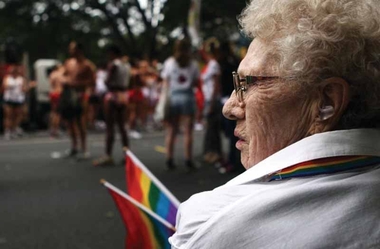Will there be LGBTQ nursing homes?

by Bruce Hartley
Life Issues Columnist
Many older LGBTQ people have tied the knot since June 26, 2015 when same-sex marriage was legalized in the United States. What does this mean for LGBTQ couples as we move into retirement and beyond? I believe it will be interesting to watch how things unveil especially in the area of healthcare.
LGBTQ senior adults grew up during a time of deep discrimination and without equal access to healthcare. We face even greater health risks as we age, according to SAGE (Services and Advocacy for Gay, Lesbian, Bisexual and Transgender Elders). We are more likely than our non-LGBTQ peers to feel isolated and vulnerable.
It is estimated that there are more three million lesbian, gay, bisexual and transgender Americans age 55+, with that number expected to double in the next 20 years. This means the world of healthcare will have to adjust in many ways. Providers will need to learn how to communicate with LGBTQ older adults and how to accommodate married LGBTQ couples with well-deserved dignity and respect.
I hope that we can be more open to our healthcare providers about our sexuality and gender. This could give us a new level of freedom that many of us have never felt. We can help the world move forward as it prepares to care for a possible six million LGBTQ seniors in the next few decades.
Healthcare providers must learn how to communicate with LGBTQ in their medical clinics, hospitals, long term care facilities and nursing homes. They need to understand that we deserve respect similar to non-LGBTQ senior adults. Our partners, significant others and spouses will be involved in our healthcare and they also deserve respect at all times.
This means we need to teach our healthcare providers about what we expect from them. We need to help them learn language such as the labels we prefer, our pronouns and how to refer to our significant other. It is our responsibility to help them learn about the LGBTQ community and this will allow for more trust and respect.
Our efforts will pay off as we age and move toward possibly living in a long-term facility or nursing home. I am sure there are many LGBTQ seniors currently living in long term facilities and nursing homes. Sadly many of them entered not being able to be open about their gender or sexuality.
Those days are over and I am thrilled that when the time comes for me, I can be open about my sexuality, gender and significant other and expect equal respect and care from my healthcare providers.
We have come a long way and we need to continue to pave the way for the younger LGBTQ generation. Happy second anniversary to same-sex marriages!
Copyright 2017 The Gayly – June 21, 2017 @ 12:10 p.m.





